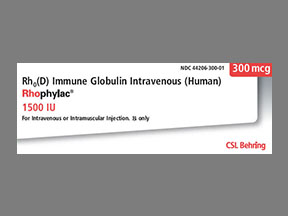
Rhophylac Coupons & Savings Card – Discount Prices from $164.69
My prescription
Edit
2ML of 1500UNIT/2ML, Rhophylac (1 Syringe)
Select pharmacy

CVS
$181.30
COUPON PRICE
Walmart
$164.69
COUPON PRICE
Walgreens
$175.68
COUPON PRICE
Albertsons
$184.74
COUPON PRICERhophylac savings card
Show this card to your pharmacist
Walmart
$164.69
BIN
ID
PCN
GRP
019876
LH97A56A4E
CHIPPO
LHX
Powered by
Price history for Rhophylac
1 Syringe, 2ML of 1500UNIT/2ML
Average retail price for Rhophylac
Average SaveHealth price for Rhophylac
Our price history data is based on aggregated prescription data collected from participating pharmacies in America. Our prescription data updates daily to reflect the latest price changes. If you notice a missing data point, it means there wasn't sufficient data available to generate a monetary value for that date.
*Retail prices are based on pharmacy claims data, and may not be accurate when we don't have enough claims.
Rhophylac dosage forms
Dosage Quantity Price from Per unit 2ML of 1500UNIT/2ML 1 Syringe $164.69 $164.69 2ML of 1500UNIT/2ML 2 Syringes $344.29 $172.15 2ML of 1500UNIT/2ML 3 Syringes $507.29 $169.10
| Dosage | Quantity | Price from | Per unit |
|---|---|---|---|
| 2ML of 1500UNIT/2ML | 1 Syringe | $164.69 | $164.69 |
| 2ML of 1500UNIT/2ML | 2 Syringes | $344.29 | $172.15 |
| 2ML of 1500UNIT/2ML | 3 Syringes | $507.29 | $169.10 |
What is Rhophylac used for?
Rhophylac is used to prevent Rh immunization in Rh-negative individuals who may be exposed to Rh-positive blood. It is commonly administered to Rh-negative pregnant women to prevent hemolytic disease of the newborn, and it can also be used following blood transfusions or other potential exposures to Rh-positive blood.
Is Rhophylac the same as RhoGAM?
Rhophylac and RhoGAM are both brand names for Rho(D) immune globulin, a medication used to prevent Rh incompatibility in pregnancy. While they serve the same purpose, they are different products from different manufacturers and may have variations in formulation or administration. It is important to follow the specific instructions provided by a healthcare provider for the product being used.
Using the SaveHealth discount card, what is the price of Rhophylac without insurance?
Using the SaveHealth discount card, the price of Rhophylac without insurance is $164.69.
What is the price of Rhophylac at CVS?
The price of Rhophylac at CVS is $181.30.
What is the price of Rhophylac at Walgreens?
The price of Rhophylac at Walgreens is $175.68.
What is the price of Rhophylac at Walmart?
The price of Rhophylac at Walmart is $164.69.
